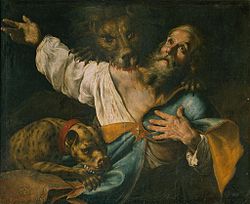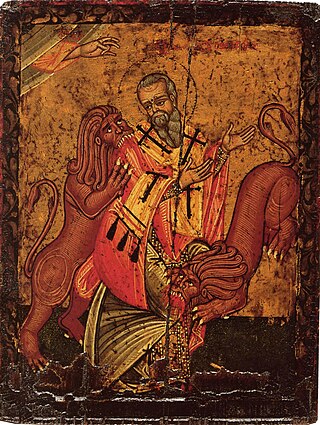
The word catholic comes from the Greek phrase καθόλου 'on the whole, according to the whole, in general', and is a combination of the Greek words κατά 'about' and ὅλος 'whole'. The first known use of "Catholic" was by the church father Saint Ignatius of Antioch in his Letter to the Smyrnaeans. In the context of Christian ecclesiology, it has a rich history and several usages.

The Epistle to the Philippians is a Pauline epistle of the New Testament of the Christian Bible. The epistle is attributed to Paul the Apostle and Timothy is named with him as co-author or co-sender. The letter is addressed to the Christian church in Philippi. Paul, Timothy, Silas first visited Philippi in Greece (Macedonia) during Paul's second missionary journey from Antioch, which occurred between approximately 50 and 52 AD. In the account of his visit in the Acts of the Apostles, Paul and Silas are accused of "disturbing the city".
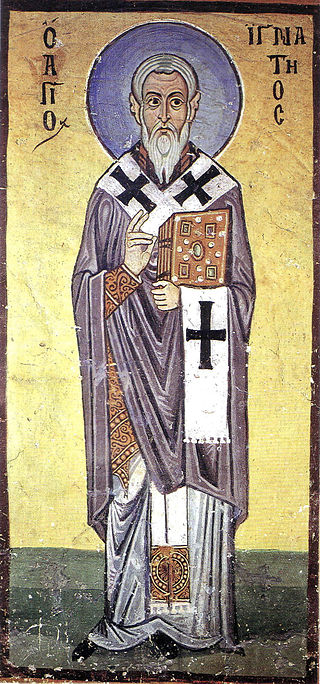
Ignatius of Antioch, also known as Ignatius Theophorus, was an early Christian writer and Patriarch of Antioch. While en route to Rome, where he met his martyrdom, Ignatius wrote a series of letters. This correspondence forms a central part of a later collection of works by the Apostolic Fathers. He is considered one of the three most important of these, together with Clement of Rome and Polycarp. His letters also serve as an example of early Christian theology, and address important topics including ecclesiology, the sacraments, and the role of bishops.

Polycarp was a Christian bishop of Smyrna. According to the Martyrdom of Polycarp, he died a martyr, bound and burned at the stake, then stabbed when the fire failed to consume his body. Polycarp is regarded as a saint and Church Father in the Eastern Orthodox Church, Roman Catholic Church, Oriental Orthodox Churches, Lutheranism, and Anglicanism.
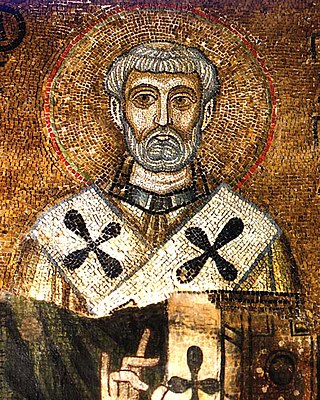
Clement of Rome, also known as Pope Clement I, was the bishop of Rome in the late first century AD. He is considered to be the first of the Apostolic Fathers of the Church, and a leading member of the Church in Rome in the late 1st century.
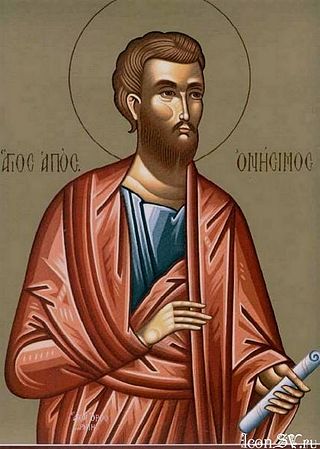
Onesimus, also called Onesimus of Byzantium and The Holy Apostle Onesimus in the Eastern Orthodox Church, was a slave to Philemon, a man of Christian faith. He may also be the same Onesimus named by Ignatius of Antioch as bishop in Ephesus which would put Onesimus's death closer to 107. If so, Onesimus went from slave to brother to bishop.

James the Just, or a variation of James, brother of the Lord, was, according to the New Testament, a brother of Jesus. He was the first leader of the Jerusalem Church of the Apostolic Age. Traditionally, it is believed he was martyred either in AD 62 by being stoned to death on the order of High Priest Ananus ben Ananus, or in AD 69 by being thrown off the pinnacle of the Temple by scribes and Pharisees and then clubbed to death. James, Joses, Simon, and Judas are mentioned as the brothers of Jesus as well as two or more unnamed sisters.
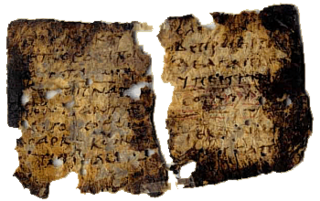
The Didache, also known as The Lord's Teaching Through the Twelve Apostles to the Nations, is a brief anonymous early Christian treatise written in Koine Greek, dated by modern scholars to the first or second century AD.
The Apostolic Fathers, also known as the Ante-Nicene Fathers, were core Christian theologians among the Church Fathers who lived in the 1st and 2nd centuries AD who are believed to have personally known some of the Twelve Apostles or to have been significantly influenced by them. Their writings, though widely circulated in early Christianity, were not included in the canon of the New Testament. Many of the writings derive from the same time period and geographical location as other works of early Christian literature which came to be part of the New Testament.

The Epistle of Polycarp to the Philippians is an epistle attributed to Polycarp, an early bishop of Smyrna, and addressed to the early Christian church in Philippi. It is widely believed to be a composite of material written at two different times, in the first half of the second century. The epistle is described by Irenaeus as follows:

The Epistle of Ignatius to the Trallians is an epistle attributed to Ignatius, a second-century Bishop of Antioch and martyr, and addressed to the church in Tralles. It was written during the bishop's transport from Antioch to his execution in Rome.

The Epistle of Ignatius to the Smyrnaeans is an epistle from circa 110 A.D. attributed to Ignatius of Antioch, a second-century bishop of Antioch, addressed to the Early Christians in Smyrna.
Early Christianity, otherwise called the Early Church or Paleo-Christianity, describes the historical era of the Christian religion up to the First Council of Nicaea in 325. Christianity spread from the Levant, across the Roman Empire, and beyond. Originally, this progression was closely connected to already established Jewish centers in the Holy Land and the Jewish diaspora throughout the Eastern Mediterranean. The first followers of Christianity were Jews who had converted to the faith, i.e. Jewish Christians, as well as Phoenicians, i.e. Lebanese Christians. Early Christianity contains the Apostolic Age and is followed by, and substantially overlaps with, the Patristic era.
The Liturgy of the eighth book of the Apostolic Constitutions is a complete text of the Christian Divine Liturgy and found in the eighth book of the Apostolic Constitutions. It is the oldest known form that can be described as a complete liturgy and can be dated to the second half of the 4th century. It belongs to the Antiochene Rite.
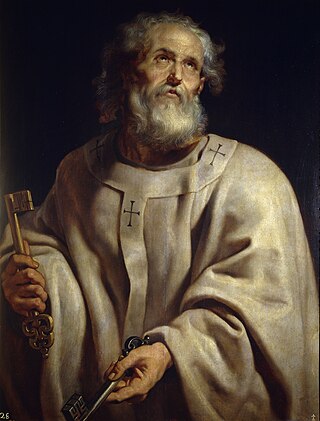
Saint Peter, also known as Peter the Apostle, Simon Peter, Simeon, Simon, or Cephas, was one of the Twelve Apostles of Jesus Christ and one of the first leaders of the early Christian Church. He appears repeatedly and prominently in all four New Testament gospels as well as the Acts of the Apostles. Catholic tradition treats Peter as the first bishop of Rome—or pope—and also as the first bishop of Antioch.
The Eastern Orthodox Church is opposed to the Roman Catholic doctrine of papal supremacy. While not denying that primacy does exist for the Bishop of Rome, Eastern Orthodox Christians argue that the tradition of Rome's primacy in the early Church was not equivalent to the current doctrine of supremacy.

The Epistle of Ignatius to the Romans is an epistle attributed to Ignatius of Antioch, a second-century bishop of Antioch. It was written during his transport from Antioch to his execution in Rome. To the Romans contains Ignatius’ most detailed explanation of his views on martyrdom.

The Epistle of Ignatius to the Magnesians is an epistle attributed to Ignatius of Antioch, a second-century bishop of Antioch, and addressed to the church in Magnesia on the Maeander. It claims to have been written during Ignatius' transport from Antioch to his execution in Rome.

The Epistle of Ignatius to Polycarp is an epistle attributed to Ignatius of Antioch, a second-century bishop of Antioch, and addressed to Polycarp, the bishop of Smyrna. Its narrative frame tells that it was written during Ignatius' transport from Antioch to his execution in Rome.

The Epistle of Ignatius to the Ephesians is an epistle attributed to Ignatius of Antioch, a second-century bishop of Antioch, and addressed to the church in Ephesus of Asia Minor. It was written during Ignatius' transport from Antioch to his execution in Rome.
